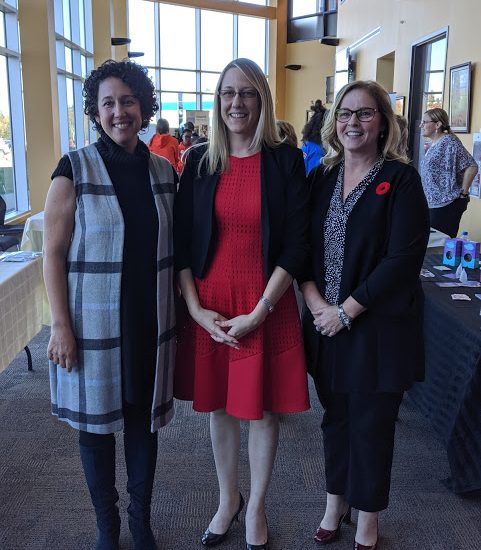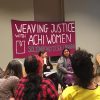
KJIPUKTUK (Halifax) – Wherever there is poverty you will find period poverty, the inability to pay for menstrual products. And given Nova Scotia’s very high poverty rates, period poverty is a very much a concern here.
Period poverty is also something you don’t hear about enough, because the problems of people who menstruate, things like the cost of menstrual products, or how having your period can really hurt and make it hard to go to work, don’t really seem to resonate much.
Two pieces of legislation, proposed by Nova Scotia’s two opposition parties, aim to make the lives of people faced with period poverty a little less awful.
Yesterday Karla MacFarlane, the PC MLA for Pictou West, and Claudia Chender, the NDP MLA for Dartmouth South, discussed their proposed bills. They did so at a panel that was part of a full-day summit on period poverty held at the NSGEU office in Burnside.
MacFarlane’s Bill 126 wants the Employment Support and Income Assistance Act amended so that a special needs allowance can be issued for menstrual products, much like expecting mothers can request a special diet allowance.
Of course the best solution is to raise the rates substantially so that anybody on income assistance can live in dignity. Until we do that people will continue to be faced with making choices between buying food or medication, or a child’s birthday present, and menstrual products. But we all know such an increase is not in the books, and MacFarlane’s proposal should be supported.
Bill 154, An Act Respecting Free Menstrual Products, the proposed legislation championed by Chender, wants to change the Occupational Health and Safety Act to make it mandatory for employers to make free menstrual products available to workers.
After all, employees don’t bring toilet paper to work, what’s so different about menstrual products?
Chender and MacFarlane are fully supportive of each other’s initiatives, which they see as complementary.
“Claudia and I are politicians and we represent different parties. But we do work together. We should just all let go of our egos as politicians, and get back to the common denominator, which is servicing our people that elected us,” said MacFarlane.
Addressing period poverty issues remains a struggle.
As a teacher in the panel audience pointed out, the announcement by the government that it will make menstrual products available in high schools became less impressive once it became clear that no new money will be allocated.
And that same day, just across the harbour from the poverty summit, at City Hall, Councillor Lorelei Nichol struggled to get staff to understand what it is she needs to make free menstrual products available in HRM facilities.
At an earlier panel speaker Shannon Hardy, a social worker who focuses on sexual and reproductive wellness, identified the crucial barrier.
“Until we have people who do not menstruate take part in the conversation, a big shift is not going to happen. We just need to look around the room and recognize that we are preaching to the choir.”
“Where are the people who need to be here?” Hardy asked.
With a special thanks to our generous donors who make publication of the Nova Scotia Advocate possible.
Subscribe to the Nova Scotia Advocate weekly digest and never miss an article again. It’s free!



